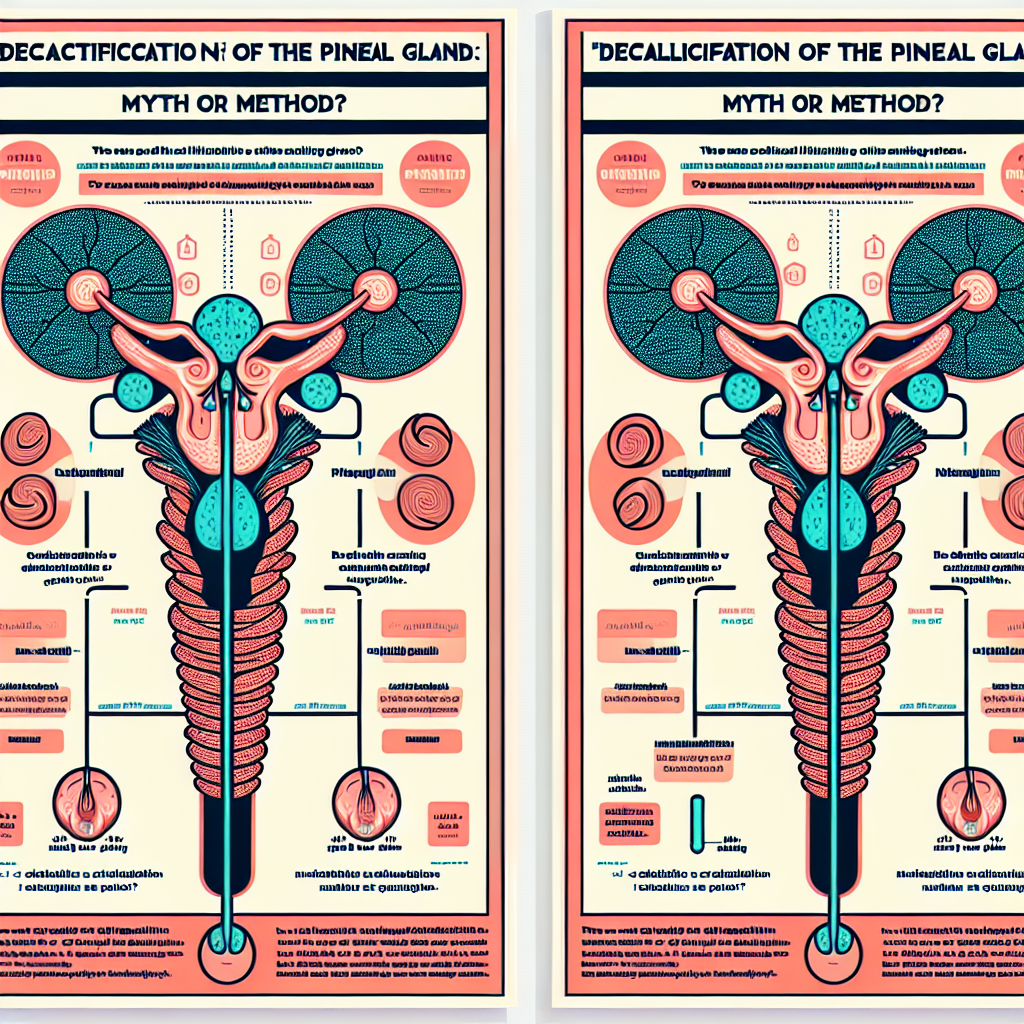Decalcifying the Pineal Gland: Myth or Method?

Discover the truth about decalcifying the Pineal Gland: Myth or Method? Dive into the facts and make an informed decision. Visit My Vibrant Vitality now.
Exploring the Truth: Decalcifying the Pineal Gland – Myth or Method?
The pineal gland, a small, pea-sized endocrine gland located in the brain, has been the subject of much speculation and intrigue. This gland, often referred to as the “third eye,” is believed by some to be a gateway to higher consciousness and spiritual awakening. However, it is also thought to become calcified due to various factors such as poor diet, exposure to toxins, and age. This calcification is believed to hinder the gland’s function and limit our spiritual growth. As a result, a concept known as “decalcifying the pineal gland” has gained popularity in certain circles. But is this a myth or a method grounded in scientific fact?
The pineal gland’s primary function, as understood by modern science, is to produce melatonin, a hormone that helps regulate sleep patterns. However, the idea of decalcifying the pineal gland is not rooted in its role in sleep regulation, but rather in more esoteric beliefs. Proponents of this concept argue that by decalcifying the pineal gland, one can unlock enhanced intuition, psychic abilities, and a more profound connection to the spiritual world.
The process of decalcification, according to these advocates, involves a combination of dietary changes, detoxification methods, and spiritual practices. This includes consuming a clean, alkaline diet, avoiding fluoride, and practicing meditation. However, it’s important to note that while these practices are generally healthy and beneficial, their specific impact on decalcifying the pineal gland is not scientifically proven.
Indeed, the scientific community remains skeptical about the concept of decalcifying the pineal gland. While it’s true that the pineal gland can become calcified, this is a natural process that occurs in many people as they age. Moreover, this calcification is not associated with any known health problems or a decrease in the gland’s ability to produce melatonin. Therefore, the notion that calcification of the pineal gland somehow impedes spiritual growth or psychic abilities is not supported by scientific evidence.
Furthermore, the idea that certain practices or dietary changes can decalcify the pineal gland is also not backed by science. While a healthy diet and regular meditation can certainly contribute to overall well-being and perhaps even enhance one’s sense of spirituality, there is no concrete evidence to suggest that they can reverse the calcification of the pineal gland.
In conclusion, the concept of decalcifying the pineal gland appears to be more myth than method. While the practices associated with this concept are generally healthy and may contribute to overall well-being, their specific impact on the pineal gland is not scientifically validated. Therefore, while it’s always beneficial to maintain a healthy lifestyle and engage in practices that promote mental and spiritual well-being, one should not expect these practices to decalcify the pineal gland or unlock hidden psychic abilities. As always, it’s important to approach such concepts with a healthy dose of skepticism and to rely on scientific evidence when making decisions about our health and well-being.
Understanding the Science: Decalcification of the Pineal Gland – Fact or Fiction?

The pineal gland, a small, pinecone-shaped endocrine gland located in the brain, has been the subject of much speculation and intrigue. This gland, often referred to as the “third eye,” is believed by some to be a gateway to higher consciousness and spiritual awakening. One popular theory suggests that the pineal gland can become calcified due to various factors such as poor diet, exposure to toxins, and age, thereby inhibiting its function. Consequently, a process known as decalcification is proposed to restore the gland’s functionality. But is decalcifying the pineal gland a myth or a method grounded in scientific fact?
To answer this question, we must first understand the role of the pineal gland. The primary function of this gland is to produce melatonin, a hormone that regulates sleep patterns. However, the pineal gland’s role in spiritual experiences and higher consciousness is not supported by scientific evidence. This notion is largely rooted in metaphysical beliefs and ancient spiritual traditions.
The concept of pineal gland calcification is not entirely unfounded. Scientific research has indeed shown that the pineal gland can accumulate calcium deposits over time, a process known as calcification. This is a common occurrence and is often associated with aging. However, the extent to which this calcification impacts the gland’s function is a subject of ongoing debate in the scientific community.
The theory that calcification inhibits the pineal gland’s function and that decalcification can restore it is largely speculative. While it is true that excessive calcification in any part of the body can potentially disrupt normal function, there is currently no definitive scientific evidence to suggest that decalcifying the pineal gland enhances its ability to produce melatonin or contributes to spiritual awakening.
The methods often suggested for decalcifying the pineal gland, such as dietary changes, detoxification, and the use of certain supplements, are generally healthy practices. They can contribute to overall well-being and may indirectly support the health of the pineal gland. However, attributing these benefits directly to the decalcification of the pineal gland is a leap that lacks scientific backing.
Moreover, it’s important to note that some proposed decalcification methods can be harmful. For instance, consuming excessive amounts of raw apple cider vinegar, a commonly suggested decalcification agent, can lead to low potassium levels and bone loss. Therefore, it’s crucial to approach these methods with caution and skepticism.
In conclusion, while the pineal gland can indeed become calcified, the notion that this calcification inhibits its function and that decalcification can restore it is largely speculative and not supported by robust scientific evidence. The proposed methods for decalcification, while generally promoting healthy habits, should not be viewed as a direct means to enhance the function of the pineal gland or achieve spiritual awakening. As always, it’s essential to approach health and wellness with a balanced perspective, grounded in scientific understanding.
The Controversy Unveiled: Pineal Gland Decalcification – Valid Technique or Baseless Myth?
The pineal gland, a small, pea-sized endocrine gland located in the brain, has been the subject of much debate and controversy in recent years. This gland, often referred to as the “third eye,” is believed by some to be a gateway to higher consciousness and spiritual awakening. However, it is also believed that the pineal gland can become calcified due to various factors such as poor diet, exposure to toxins, and aging, thereby hindering its function and blocking spiritual growth. This has led to the emergence of various techniques and methods aimed at decalcifying the pineal gland. But is pineal gland decalcification a valid technique or a baseless myth? Let’s delve into this controversy and unveil the truth.
The concept of pineal gland decalcification is rooted in the belief that the gland can become calcified, or hardened, due to the accumulation of calcium phosphate crystals. This calcification is thought to impair the gland’s ability to produce melatonin, a hormone that regulates sleep and wake cycles, and to interfere with its spiritual functions. Proponents of pineal gland decalcification argue that by removing these calcifications, one can restore the gland’s function and unlock its spiritual potential.
Methods of decalcification often involve dietary changes, detoxification protocols, and the use of certain supplements. For instance, some recommend avoiding fluoride, a substance found in many toothpastes and public water supplies, as it is believed to contribute to pineal gland calcification. Others suggest consuming foods rich in antioxidants and anti-inflammatory compounds, such as fruits and vegetables, to combat oxidative stress and inflammation, which are thought to play a role in calcification. Additionally, supplements like iodine and magnesium are often recommended to aid in the decalcification process.
However, while these methods may promote overall health and well-being, their effectiveness in decalcifying the pineal gland is a matter of debate. Scientific evidence supporting the concept of pineal gland decalcification is limited. Most studies on pineal gland calcification have focused on its potential role in certain diseases, such as Alzheimer’s and Parkinson’s, rather than its impact on spiritual growth or consciousness.
Moreover, while it is true that the pineal gland can become calcified, this is a normal part of aging and is not necessarily associated with any adverse health effects. In fact, a study published in the journal “Radiology” found that pineal gland calcification is common in adults and is not linked to sleep disorders or other health problems. This suggests that the need for decalcification may be overstated.
Furthermore, the idea that the pineal gland is a “third eye” or a gateway to higher consciousness is largely metaphysical and lacks scientific backing. While the pineal gland does play a role in regulating sleep and wake cycles, its connection to spirituality is speculative and not supported by empirical evidence.
In conclusion, while the concept of pineal gland decalcification is intriguing and has gained popularity in certain circles, it remains controversial and lacks solid scientific support. While maintaining a healthy lifestyle and diet can certainly contribute to overall well-being, the idea that specific techniques or supplements can decalcify the pineal gland and unlock spiritual potential is largely speculative. As always, it is advisable to approach such claims with a healthy dose of skepticism and to consult with a healthcare professional before embarking on any new health regimen.